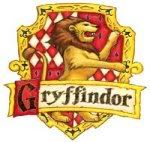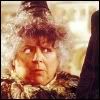Post by The Anglophile on Jun 23, 2007 20:45:03 GMT -5
A/N: Right, so. I posted this on ff.net a short while ago but never on here for some reason...Reviews over there were exceedingly lovely, but I still think this is a bit off. Maybe you'll enjoy it anyway. ^^;;
“Checkmate.”
“No!”
“Checkmate, Albus. I’ve won.”
“Impossible, Minerva, I never lose,” Albus bent over the chessboard, his brow furrowing as he examined the pieces, determined to prove his prowess.
“I’ve won, Albus, give it up.”
He looked up. Minerva gazed smugly at him, her chin stuck up at a jaunty angle and her willowy arms folded across her chest.
“I don’t know how you did it, but I will figure it out,” he shook a finger at her, but the gesture only strengthened her smirk. “Let’s play again.” He reached eagerly for his pieces.
“Albus, it’s nearly twelve-thirty,” Minerva frowned disapprovingly at the clock.
“Scared, aren’t you?”
“Oh, quite,” she said, dripping with sarcasm. “I, unlike you, do have classes to teach tomorrow and would rather like to be well-rested and presentable.”
“Are you suggesting I’m not presentable?” he raised his eyebrows, fighting to keep his face straight.
“Of course,” she nodded merrily. He couldn’t help but laugh. “Anyway, I’ll play you again tomorrow night. You’ll see, you’re not invincible.”
With another teasing smile, Minerva slipped out of his sitting room. The silence she left in her wake was almost suffocating, and Albus felt the strange desire to get up and follow her. He frowned, bemused, and shook off the sensation. He sighed as he put away the chessboard. He hadn’t expected this. He had asked Minerva to play chess on a whim, and the results had been surprising, to say the least. He never lost at chess.
“I’ve won again.”
“You haven’t,” Albus gaped wide-eyed at the board.
“I think you’ll find I have,” Minerva laughed. “Checkmate.”
Her queen practically sauntered over to smash in his king’s head. Albus winced.
“Are you still bent on discovering my non-existent strategy?” Minerva asked, for they were on their sixteenth game of the evening, seven of which she had won.
“I will discover it,” he assured her, ignoring her as she rolled her eyes. He drew a sheet of parchment and a pencil out of his pocket.
“What’s that?” she peered curiously at it.
“A score sheet,” Albus said nonchalantly, adding tallies to the two columns. “I’m keeping track of how many games we each win.” He added a final tally under the column titled “Minerva.”
Minerva laughed quietly at him as she collected her pieces.
“You’re obsessed, Albus.”
“I haven’t lost since I was twenty-nine,” he informed her haughtily. “You must have some sort of method I’ve just never before encountered.”
“Or perhaps I’m just that talented?”
“And I will discover it,” he said firmly, pointing his pencil at her.
“You poor old man,” she said through a fresh peal of laughter. “Shall I come again tomorrow?”
“Please do.”
Minerva began spending her evenings in Albus’s sitting room several times a week. Albus found himself looking forward to her visits more than anything, and more than once he had to rewrite a letter because he had written “Minerva” instead of “Minister” or “chess” instead of “Albania.” Rather than admit to himself how much he enjoyed Minerva’s company, Albus brushed the possibility aside and credited it to his love of chess.
“You’re distracting me somehow,” Albus said, taking another stab at the strategy he still believed was the secret to her success. While she never won all the games, she always vexed him by managing to win about half.
“What, with my feminine wiles? No, Albus, we’ve been over this a hundred times, I have no secret strategy!” Minerva struck the air with the back of her hand with each syllable to emphasise her point. “I wish you would get over this obsession, it’s unhealthy.”
Albus added another tally to Minerva’s column on his score sheet, then examined the paper, chewing absent-mindedly on the end of his pencil.
“Will you come again tomorrow?” he asked hopefully.
“Yes,” Minerva answered. Focused on the parchment, he didn’t see her blush.
“Did you know that Minerva is a genius at chess, Poppy?” Albus asked, glancing up the staffroom table at Minerva, who pursed her lips and rolled her eyes.
“Oh, is that so?” Poppy gave Minerva a sympathetic smile.
“She’s the only person who’s beaten me at chess since I was twenty-nine,” he said proudly. Poppy narrowed her eyes calculatingly at him.
“You’re very passionate about the subject,” she noted after a moment.
“It’s chess, how can I not be?” he asked, beaming at Poppy and completely missing her point. Minerva, who began to quickly gather her papers together and murmur excuses about being tired, had not. Albus concluded that the fire must have caused her ears to go slightly pink, but he couldn’t say why Poppy kept glancing between the two of them until Minerva had shut the door.
Poppy leaned back in her chair and fixed Albus with a knowing smile, chewing contemplatively on the inside of her cheek. Albus opened his book and ignored her, assuming from her smug grin that an explanation would spill forth soon enough. Finally, Poppy sat up straight.
“You should do something soon, you know, before she convinces herself that you don’t love her.”
Albus jumped a little, quite taken aback.
“I’m sorry, Poppy, but I have no idea how you came to such an extraordinary conclusion,” he said, snapping his book shut and going to the door.
“But—”
“Goodnight, Poppy,” he shut the door with a small click and left Poppy tsking in annoyance.
As Albus wandered back through the corridors to his rooms, he cursed quietly to himself, realising that, reluctant as he was to admit it, Poppy’s assumption had been quite correct. He cared for Minerva more than a little, certainly—but Poppy seemed to be under the impression that Minerva loved him. He could not believe this was possible and wondered if Poppy needed more work to keep her mind from becoming idle and imaginative. Minerva surely saw him as just a friend, or maybe a father figure. Albus snorted. More like a grandfather figure.
No, he decided, Poppy was wrong about Minerva’s feelings. Albus told himself that he would have to be satisfied with just Minerva’s friendship. He sighed heavily, feeling older than he had in years.
“Ha! Checkmate!”
“Well done, Albus, your fourth success of the evening,” Minerva grinned at him, highly unperturbed by her loss. Albus added a tally to his column with a flourish of his pencil.
“You knew it was coming.”
“Of course I did, I never win them all,” she shook her head. “You’re lucky I enjoy your company so much. I wouldn’t play chess with you otherwise, you have an abominable ego.”
“I do not.”
“Aren’t you the one keeping score?” she challenged. “And just a few weeks ago you were saying you hadn’t lost a game of chess since you were thirty—”
“Twenty-nine,” he corrected her quickly.
“See?” she couldn’t suppress a smirk.
“Oh, fine,” Albus sighed and grinned at her. “But at least I’m only boastful about chess.”
“I suppose even you have your redeeming qualities,” Minerva conceded airily. He chuckled and gazed at her, admiring how her black hair shone in the firelight, how lively her eyes became when she teased him.
“You know, I really do enjoy our games, Minerva,” he said.
“Do you?” she asked casually, suddenly very interested in a loose thread on her sleeve. When he was silent, she glanced up at him nervously.
“Well, Minerva, it’s getting late, you should probably go,” he told her, rather wishing he could ask her to stay. She frowned at the floor for a moment.
“Goodnight, then,” she flashed him a smile and slipped away.
“How many games have I won tonight, Albus?” Minerva eyed his score sheet and sipped her tea.
“Seven out of ten,” he informed her, chewing on his pencil again.
“Well over half? You’re losing your touch,” she teased him, but he noticed an odd flicker of concern in her deep green eyes.
“I’ll just have to practice some more,” he said weakly. Minerva scowled briefly.
“Are you sure you’re alright? You’re not acting like yourself,” she bit her lower lip and studied his face. Albus felt a sudden jolt in his chest. A dozen thoughts tumbled through his head—he wanted to tell her that he didn’t care about chess anymore, he cared about seeing her.
“I’m fine, my dear,” he told her simply. He didn’t realise he’d used the endearment.
Minerva smiled softly, automatically reaching across the chessboard to hold his hand. After a moment, she realised what she had done and stiffened, guiltily pulling back her hand.
“Minerva—”
“I should go. I’ll see you in the morning,” she told him, darting out of the room.
The next morning, Minerva greeted Albus at breakfast with a warm smile. She acted as though nothing had happened, joking with him as always, but he noticed as he passed her the butter dish that she took great care to avoid touching him. He watched her out of the corner of his eye. What could this mean? Was she repulsed by him? This thought was so disheartening that Albus’s mind floundered and he wondered if he should seek out Poppy’s advice. Imagining the woman’s smug grin, however, put him off the idea.
He noticed suddenly that Minerva was swallowing the last of her tea.
“Are you busy tonight?” he asked quickly before she could run away.
“Er—no, I’m not.”
“Come and play chess.”
“Oh, Albus, I’m getting sick to death of chess,” she snapped impatiently.
“Just one more game then, and I’ll have your strategy cracked,” he pleaded.
“I’ve told you, I have no secret methods,” she told him quietly. She stared at her empty plate for a moment. “I’ll be there at eight,” she finally said, nearly running out of the room before he could tell her how glad he was.
At seven-thirty, Albus began to pace his sitting room. He was going to do it. He had to tell her, Poppy had been right about that. He worked out an eloquent confession of his love in his head, and was very pleased with it, but his pretty speech disintegrated at the sound of her knock.
“Good evening, Minerva, do sit down,” he ushered her in, laying on the cheerfulness in an attempt to cover up his nerves.
“So,” Minerva said crisply, setting up her pieces, “is tonight the night you finally stop being foolish?”
“I’m sorry?” Albus accidentally knocked over his knight.
“Will you finally see reason and abandon you sad attempts to pin down my strategy? You need to learn to accept that I’m just good at chess,” she said simply, a hint of her glowing smugness returning as she set down a pawn a little more forcefully than necessary.
“I love you,” he blurted out.
Her head snapped up and she stared at him, open-mouthed, for several long, silent moments, then seized his pencil from the table and threw it at him.
“Ow!” Albus exclaimed, rubbing his eye, which the pencil had nearly gouged.
“That is not an amusing trick to pull on me, Albus!” Minerva fumed. “Just because I made a slip and you figured out that I love you doesn’t mean you should tease me about it!”
“Minerva! I wasn’t teasing you!”
Minerva blinked incredulously at him.
“But—you can’t be serious.”
“I haven’t been this serious in a long time,” he said quietly, still massaging his throbbing eye. “Do you,” he asked tentatively, “really love me?”
“Yes,” she said, blushing furiously but smiling broadly at him. Grinning ecstatically, Albus abandoned his sore eye and reached across the small table to take her face in his hands.
“I’m sorry I didn’t tell you sooner,” he said softly, leaning closer.
“I’m sorry about your eye,” she smirked, just barely, before their lips met.
Checkmate
“Checkmate.”
“No!”
“Checkmate, Albus. I’ve won.”
“Impossible, Minerva, I never lose,” Albus bent over the chessboard, his brow furrowing as he examined the pieces, determined to prove his prowess.
“I’ve won, Albus, give it up.”
He looked up. Minerva gazed smugly at him, her chin stuck up at a jaunty angle and her willowy arms folded across her chest.
“I don’t know how you did it, but I will figure it out,” he shook a finger at her, but the gesture only strengthened her smirk. “Let’s play again.” He reached eagerly for his pieces.
“Albus, it’s nearly twelve-thirty,” Minerva frowned disapprovingly at the clock.
“Scared, aren’t you?”
“Oh, quite,” she said, dripping with sarcasm. “I, unlike you, do have classes to teach tomorrow and would rather like to be well-rested and presentable.”
“Are you suggesting I’m not presentable?” he raised his eyebrows, fighting to keep his face straight.
“Of course,” she nodded merrily. He couldn’t help but laugh. “Anyway, I’ll play you again tomorrow night. You’ll see, you’re not invincible.”
With another teasing smile, Minerva slipped out of his sitting room. The silence she left in her wake was almost suffocating, and Albus felt the strange desire to get up and follow her. He frowned, bemused, and shook off the sensation. He sighed as he put away the chessboard. He hadn’t expected this. He had asked Minerva to play chess on a whim, and the results had been surprising, to say the least. He never lost at chess.
“I’ve won again.”
“You haven’t,” Albus gaped wide-eyed at the board.
“I think you’ll find I have,” Minerva laughed. “Checkmate.”
Her queen practically sauntered over to smash in his king’s head. Albus winced.
“Are you still bent on discovering my non-existent strategy?” Minerva asked, for they were on their sixteenth game of the evening, seven of which she had won.
“I will discover it,” he assured her, ignoring her as she rolled her eyes. He drew a sheet of parchment and a pencil out of his pocket.
“What’s that?” she peered curiously at it.
“A score sheet,” Albus said nonchalantly, adding tallies to the two columns. “I’m keeping track of how many games we each win.” He added a final tally under the column titled “Minerva.”
Minerva laughed quietly at him as she collected her pieces.
“You’re obsessed, Albus.”
“I haven’t lost since I was twenty-nine,” he informed her haughtily. “You must have some sort of method I’ve just never before encountered.”
“Or perhaps I’m just that talented?”
“And I will discover it,” he said firmly, pointing his pencil at her.
“You poor old man,” she said through a fresh peal of laughter. “Shall I come again tomorrow?”
“Please do.”
Minerva began spending her evenings in Albus’s sitting room several times a week. Albus found himself looking forward to her visits more than anything, and more than once he had to rewrite a letter because he had written “Minerva” instead of “Minister” or “chess” instead of “Albania.” Rather than admit to himself how much he enjoyed Minerva’s company, Albus brushed the possibility aside and credited it to his love of chess.
“You’re distracting me somehow,” Albus said, taking another stab at the strategy he still believed was the secret to her success. While she never won all the games, she always vexed him by managing to win about half.
“What, with my feminine wiles? No, Albus, we’ve been over this a hundred times, I have no secret strategy!” Minerva struck the air with the back of her hand with each syllable to emphasise her point. “I wish you would get over this obsession, it’s unhealthy.”
Albus added another tally to Minerva’s column on his score sheet, then examined the paper, chewing absent-mindedly on the end of his pencil.
“Will you come again tomorrow?” he asked hopefully.
“Yes,” Minerva answered. Focused on the parchment, he didn’t see her blush.
“Did you know that Minerva is a genius at chess, Poppy?” Albus asked, glancing up the staffroom table at Minerva, who pursed her lips and rolled her eyes.
“Oh, is that so?” Poppy gave Minerva a sympathetic smile.
“She’s the only person who’s beaten me at chess since I was twenty-nine,” he said proudly. Poppy narrowed her eyes calculatingly at him.
“You’re very passionate about the subject,” she noted after a moment.
“It’s chess, how can I not be?” he asked, beaming at Poppy and completely missing her point. Minerva, who began to quickly gather her papers together and murmur excuses about being tired, had not. Albus concluded that the fire must have caused her ears to go slightly pink, but he couldn’t say why Poppy kept glancing between the two of them until Minerva had shut the door.
Poppy leaned back in her chair and fixed Albus with a knowing smile, chewing contemplatively on the inside of her cheek. Albus opened his book and ignored her, assuming from her smug grin that an explanation would spill forth soon enough. Finally, Poppy sat up straight.
“You should do something soon, you know, before she convinces herself that you don’t love her.”
Albus jumped a little, quite taken aback.
“I’m sorry, Poppy, but I have no idea how you came to such an extraordinary conclusion,” he said, snapping his book shut and going to the door.
“But—”
“Goodnight, Poppy,” he shut the door with a small click and left Poppy tsking in annoyance.
As Albus wandered back through the corridors to his rooms, he cursed quietly to himself, realising that, reluctant as he was to admit it, Poppy’s assumption had been quite correct. He cared for Minerva more than a little, certainly—but Poppy seemed to be under the impression that Minerva loved him. He could not believe this was possible and wondered if Poppy needed more work to keep her mind from becoming idle and imaginative. Minerva surely saw him as just a friend, or maybe a father figure. Albus snorted. More like a grandfather figure.
No, he decided, Poppy was wrong about Minerva’s feelings. Albus told himself that he would have to be satisfied with just Minerva’s friendship. He sighed heavily, feeling older than he had in years.
“Ha! Checkmate!”
“Well done, Albus, your fourth success of the evening,” Minerva grinned at him, highly unperturbed by her loss. Albus added a tally to his column with a flourish of his pencil.
“You knew it was coming.”
“Of course I did, I never win them all,” she shook her head. “You’re lucky I enjoy your company so much. I wouldn’t play chess with you otherwise, you have an abominable ego.”
“I do not.”
“Aren’t you the one keeping score?” she challenged. “And just a few weeks ago you were saying you hadn’t lost a game of chess since you were thirty—”
“Twenty-nine,” he corrected her quickly.
“See?” she couldn’t suppress a smirk.
“Oh, fine,” Albus sighed and grinned at her. “But at least I’m only boastful about chess.”
“I suppose even you have your redeeming qualities,” Minerva conceded airily. He chuckled and gazed at her, admiring how her black hair shone in the firelight, how lively her eyes became when she teased him.
“You know, I really do enjoy our games, Minerva,” he said.
“Do you?” she asked casually, suddenly very interested in a loose thread on her sleeve. When he was silent, she glanced up at him nervously.
“Well, Minerva, it’s getting late, you should probably go,” he told her, rather wishing he could ask her to stay. She frowned at the floor for a moment.
“Goodnight, then,” she flashed him a smile and slipped away.
“How many games have I won tonight, Albus?” Minerva eyed his score sheet and sipped her tea.
“Seven out of ten,” he informed her, chewing on his pencil again.
“Well over half? You’re losing your touch,” she teased him, but he noticed an odd flicker of concern in her deep green eyes.
“I’ll just have to practice some more,” he said weakly. Minerva scowled briefly.
“Are you sure you’re alright? You’re not acting like yourself,” she bit her lower lip and studied his face. Albus felt a sudden jolt in his chest. A dozen thoughts tumbled through his head—he wanted to tell her that he didn’t care about chess anymore, he cared about seeing her.
“I’m fine, my dear,” he told her simply. He didn’t realise he’d used the endearment.
Minerva smiled softly, automatically reaching across the chessboard to hold his hand. After a moment, she realised what she had done and stiffened, guiltily pulling back her hand.
“Minerva—”
“I should go. I’ll see you in the morning,” she told him, darting out of the room.
The next morning, Minerva greeted Albus at breakfast with a warm smile. She acted as though nothing had happened, joking with him as always, but he noticed as he passed her the butter dish that she took great care to avoid touching him. He watched her out of the corner of his eye. What could this mean? Was she repulsed by him? This thought was so disheartening that Albus’s mind floundered and he wondered if he should seek out Poppy’s advice. Imagining the woman’s smug grin, however, put him off the idea.
He noticed suddenly that Minerva was swallowing the last of her tea.
“Are you busy tonight?” he asked quickly before she could run away.
“Er—no, I’m not.”
“Come and play chess.”
“Oh, Albus, I’m getting sick to death of chess,” she snapped impatiently.
“Just one more game then, and I’ll have your strategy cracked,” he pleaded.
“I’ve told you, I have no secret methods,” she told him quietly. She stared at her empty plate for a moment. “I’ll be there at eight,” she finally said, nearly running out of the room before he could tell her how glad he was.
At seven-thirty, Albus began to pace his sitting room. He was going to do it. He had to tell her, Poppy had been right about that. He worked out an eloquent confession of his love in his head, and was very pleased with it, but his pretty speech disintegrated at the sound of her knock.
“Good evening, Minerva, do sit down,” he ushered her in, laying on the cheerfulness in an attempt to cover up his nerves.
“So,” Minerva said crisply, setting up her pieces, “is tonight the night you finally stop being foolish?”
“I’m sorry?” Albus accidentally knocked over his knight.
“Will you finally see reason and abandon you sad attempts to pin down my strategy? You need to learn to accept that I’m just good at chess,” she said simply, a hint of her glowing smugness returning as she set down a pawn a little more forcefully than necessary.
“I love you,” he blurted out.
Her head snapped up and she stared at him, open-mouthed, for several long, silent moments, then seized his pencil from the table and threw it at him.
“Ow!” Albus exclaimed, rubbing his eye, which the pencil had nearly gouged.
“That is not an amusing trick to pull on me, Albus!” Minerva fumed. “Just because I made a slip and you figured out that I love you doesn’t mean you should tease me about it!”
“Minerva! I wasn’t teasing you!”
Minerva blinked incredulously at him.
“But—you can’t be serious.”
“I haven’t been this serious in a long time,” he said quietly, still massaging his throbbing eye. “Do you,” he asked tentatively, “really love me?”
“Yes,” she said, blushing furiously but smiling broadly at him. Grinning ecstatically, Albus abandoned his sore eye and reached across the small table to take her face in his hands.
“I’m sorry I didn’t tell you sooner,” he said softly, leaning closer.
“I’m sorry about your eye,” she smirked, just barely, before their lips met.










 lol It was awesome though! I'm just sorry for Albus! lol Amazing job!
lol It was awesome though! I'm just sorry for Albus! lol Amazing job!


 x
x





